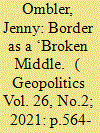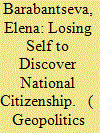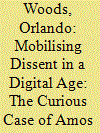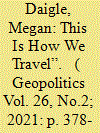|
|
|
Sort Order |
|
|
|
Items / Page
|
|
|
|
|
|
|
| Srl | Item |
| 1 |
ID:
177716


|
|
|
|
|
| Summary/Abstract |
This article explores the intimate entanglements of heteronormative power, citizenship and affect in the UK family migration visa. It pays particular attention to the material intricacies of the application process itself and the place of narration and emotional investment central to this form of government. The power of the family visa is how it is attuned to the explicit quantification and categorisation of intimate relationships on which claim to territorial rights rest. Drawing on both the analytical and methodological promise of work on ‘intimacy’ we take the family visa as a particular site for exploring our own intimate entanglement and complicity in this practice of ‘geopolitical making’- that is as both subjects and researchers of the visa. We are interested in how the visa both relies upon and produces certain forms of intimacy, particularly through processes of ‘archiving’ and the intricacies, solidarities and fragments that this is entangled with. We thus explore how we are both authors and subjects of the reproduction of heteronormative order central to visa and the drawing of borders around sanctified and unsanctified intimacy.
|
|
|
|
|
|
|
|
|
|
|
|
|
|
|
|
| 2 |
ID:
177722


|
|
|
|
|
| Summary/Abstract |
This Afterword pulls together the articles featured in this special section by commenting on the shared, though sometimes tacit, ethnographic methodology used by each. Ethnographic methodologies tend to rely on intimate research techniques that have been developed to lend a sense of specificity and veracity to reported subject matter involving human experience. This kind of research provides an important contribution to disciplines that have not traditionally used it. Yet at the same time, ethnographic research in all disciplines tends to preserve a shortcoming. Ethnographically inclined researchers have difficulty considering and writing about the very intimacy that elicits ethnography itself. Perhaps attending to what some anthropologists call ‘coevalness’ in the research process could help to foreground the shared and very intimate acts of meaning-making involved and assist in theorizing intimacy as a concept.
|
|
|
|
|
|
|
|
|
|
|
|
|
|
|
|
| 3 |
ID:
177724


|
|
|
|
|
| Summary/Abstract |
This paper seeks to expand recent interest in the material practices, policy techniques and technopolitics of borders, migration and solidarity initiatives in Europe by connecting this debate to Sloterdijk’s spherological philosophy. With his thematization of enclosures, atmospheres, foams and life support Sloterdijk helps us to give a more morphological account of borders. We illustrate the benefits of this move by reflecting on the recent questions of hostile environment and the criminalization of migrant solidarity practices and movements. The paper also highlights certain limitations in Sloterdijk’s thoughts, which appear when it is brought into migration research. Arguing that Sloterdijk remains somewhat sedantarist in his approach to atmosphere we introduce a concept of the envelope as a way to foster a more dynamic, agonistic and mobilityfocused conception of enclosure.
|
|
|
|
|
|
|
|
|
|
|
|
|
|
|
|
| 4 |
ID:
177727


|
|
|
|
|
| Summary/Abstract |
Critical border studies is increasingly articulating ethical approaches to borders and bordering practises. In this paper, I heed this impulse, by articulating a notion of the border as a ‘broken middle’ in which the bounds of the absolute are challenged and held answerable for injustices. The ‘broken middle’ is a concept developed by British theorist Gillian Rose, for whom it represents a dialectic conceptual space both between and within apparent binaries. The broken middle requires a reassembly of the bounds of each—a confrontation of self—in the pursuit of an evasive yet hopeful ethics. The application of the broken middle to the border illuminates the ambiguities of its physical space, and the ways in which bordering practises represent the imposition of unjust binaries. I finish by considering how a work by Beit Sahour-based collective, Decolonising Architecture Art Residency (DAAR), begins the difficult, pragmatic, and ever-hopeful work of the broken middle in the border.
|
|
|
|
|
|
|
|
|
|
|
|
|
|
|
|
| 5 |
ID:
177728


|
|
|
|
|
| Summary/Abstract |
This paper addresses the idea of geopolitics of hunger as proposed by a Brazilian geographer, Josué de Castro, whose originality and international impact in the fields of critical geography and development studies still merit fuller acknowledgement both within and beyond the discipline of geography. Drawing upon archival research on de Castro’s correspondences and scholarly networks and on the editorial history of his key book Geopolitics of Hunger, first I argue that de Castro was a forerunner of the definition of geopolitics in a critical sense and that this nonconformist attitude has been one of the primary reasons for his persistent scholarly neglect. Second, I argue that de Castro’s anti-colonial geopolitics, based on subaltern agency, furnishes powerful arguments to present-day critics of ‘food security’, who challenge the revival of Malthusian concepts, Euro-centric views and neo-colonial recipes in development debates, a clear geopolitical matter for contemporary scholarly and political conversations. Finally, de Castro’s international networking and his biography as a political dissident and exile provide some useful practical examples of performing geopolitical discourses outside institutional and statist frameworks.
|
|
|
|
|
|
|
|
|
|
|
|
|
|
|
|
| 6 |
ID:
177721


|
|
|
|
|
| Summary/Abstract |
This article offers an account of the ‘globally intimate’ injustices of everyday borders in Calais, showing how a racialised geopolitics of global borders is embodied locally through everyday practices of segregation. The intimate everyday embodiment of this segregation is crucial to the creation of a hostile environment for people racially identified as ‘irregular’ and underlies the border’s power of division and world-making. Yet also, in the everyday lives of those struggling with and against this segregation, we find powerful political opposition to the border’s injustices embodied in intimate ways. This article argues that a ‘globally intimate’ lens provides important insights into the racialised violence required to maintain geopolitical borders while at the same time revealing borders as sites of political contestation.
|
|
|
|
|
|
|
|
|
|
|
|
|
|
|
|
| 7 |
ID:
177725


|
|
|
|
|
| Summary/Abstract |
This article examines recent renewable energy initiatives in two hydrocarbon rich states of Eurasia: Kazakhstan and Russia. The global nature of challenges surrounding energy and natural resource use demand that sustainability and “energy transition” policies be understood as geopolitical issues, which are increasingly (re)defining political relations among and within states. Existing research and media coverage of international energy politics in Eurasia is overwhelmingly dominated by a focus on oil and gas extraction, especially in Kazakhstan and Russia, due to their central place in traditional hydrocarbon fuels markets. As elsewhere in the world, however, political and economic leaders in both countries have started to adopt the language of promoting environmental sustainability, the “green economy,” and renewable energy infrastructures. Taking a critical geopolitics lens to recent developments, this article considers who is involved in advancing renewable energy in contexts that have traditionally been dependent on traditional energy sources, and what this may portend for the shifting energy landscape of Eurasia.
|
|
|
|
|
|
|
|
|
|
|
|
|
|
|
|
| 8 |
ID:
177726


|
|
|
|
|
| Summary/Abstract |
A growing body of research has shown the geopolitical significance of place naming, yet recent contributions have called for new conceptual and methodological approaches. Drawing on mixed-methods research examining place naming processes, this study analyses Ramallah Municipality’s street naming project in the occupied Palestinian territories. It argues that the naming project was bound up with the municipality’s desire to develop a governable and modernized de facto capital city in the context of quasi-statelessness and occupation. Moreover, the naming project formed an opportunity for the municipality to inscribe Palestinian counter-memory on the landscape in the context of Palestinian cultural and material dispossession. However, residents of Ramallah viewed the new toponymic regime as a project of the perceived Palestinian ‘elite’ that served to erase local memory in a rapidly changing city. This analysis of the construction, reception and negotiation of street naming as a process reveals much about the internally contested process of state formation under occupation and the political geography and geopolitics of Palestine/Israel.
|
|
|
|
|
|
|
|
|
|
|
|
|
|
|
|
| 9 |
ID:
177719


|
|
|
|
|
| Summary/Abstract |
Inspired by Kei Iwaki’s observation about migration and language discussed in her book, Farewell, My Orange (2013), this article examines migrants’ relationship to the host community’s language in parallel to their ambivalent sense of belonging. Migrants are eager to master the host community’s language and be part of the community. At the same time, they are suspicious of their own eagerness to do so. Rather than asking, ‘How can the acquisition of the local language facilitate better integration of migrants?’, the question that animates this article is: what kind of image of home is communicated by the narrative which assumes language to be a critical tool for integration? How might we start thinking about home differently if we are to address migrants’ desire to be part of the community and, at the same time, their refusal to be part of it? To investigate these questions, I will draw on Bonnie Honig’s concept of dilemmatic space. I will argue that home, which emerges in migrants’ paradoxical emotional terrain, is a place of untranslatability where foreignness remains incomprehensible.
|
|
|
|
|
|
|
|
|
|
|
|
|
|
|
|
| 10 |
ID:
177718


|
|
|
|
|
| Summary/Abstract |
This paper considers the ways in which borders are intimately inhabited through processes of attachment. It does so by foregrounding constructions of ‘home’ in the lives of migrant women who were part of a multicultural network in the North of England. Inspired by the concept of ‘the intimate’ it looks at how attachments – understood as connections located in modes of sensation – work to produce the border as a zone of practice by enabling a distinction between the norm of belonging and the exception of otherness. This paper thus adds to our understanding of the complexity of bordering by helping us understand better how borders are inhabited through attachments (in particular, familiarity, loss, hope, nostalgia and friendship) rather than simply traversed. It furthermore builds on our understanding of ‘home’ as an important geopolitical site beyond its association with mere safety or with danger by reflecting on how home operates more widely in relation to these broader processes of attachment. Drawing on the work of Homi Bhabha and his concept of the supplement, the paper argues that the observed spatial entanglement in lives lived is productive of an alternative logic of both/and – which highlights interconnection and co-constitution of scale – rather than the standard logics of either/or, which prioritises ranking and ordering of scale. Doing so, the paper demonstrates that opening up ideas of home, through drawing on ‘the intimate’ and focusing on questions of attachment, helps us to think through broader conceptions of life we encounter linked to the border beyond the reduction of human life, desire and allegiances to hierarchical accounts of social connections.
|
|
|
|
|
|
|
|
|
|
|
|
|
|
|
|
| 11 |
ID:
177715


|
|
|
|
|
| Summary/Abstract |
In this introduction to the special section on “Engaging Geopolitics through the Lens of the Intimate”, we first locate the papers collected here in the context of developing an “Intimate Geopolitics” project at the University of Manchester. We then review the importance of ‘intimacy’ and the concept of ‘the intimate’ across an array of disciplinary studies, drawing especially on the rich body of work by critical geopolitics scholars who have long challenged categorical binaries and territorial boundaries. Our focus here is exploring what insights we can bring to understanding the nexus of intimacy and global politics by deploying the lens of the intimate--understood as a variety of processes of attachment and relationality--in six globally dispersed case studies. Collectively, the papers presented here not only engage a wide range of issues and locations, but also contribute to research engaging geographically specific contexts and practices. We note that the papers ‘cluster’ around issues of migration, borders, ‘home’, asylum and visa regimes, prompting us to suggest that the papers productively inform three foci of inquiry. Specifically, the papers 1) enrich our understanding of bordercrossing beyond simple association of this with the movement of people, things and ideas; 2) deepen our understanding of how geopolitics is constituted by forms of attachments and relationality that are integral to forms of governance; and 3) help us explore how attachments are not simply additive but productive of geopolitical concerns.
|
|
|
|
|
|
|
|
|
|
|
|
|
|
|
|
| 12 |
ID:
177723


|
|
|
|
|
| Summary/Abstract |
“The bedroom’s hierarchy,” once observed Cynthia Enloe, “is not unconnected to the hierarchies of the international coffee exchange or of the foreign ministry” (Enloe 2004, 31). With this statement, she asks us to not only question the constitution of spaces where politics are assumed to happen, but also our tendency to dissociate them. The Intimacies of Four Continents, The Carpertbaggers of Kabul, and Intimate Mobilities go well beyond confirming Enloe’s observation: they show us through which narratives, theoretical assumptions, and material processes hierarchies are constituted, connected, and challenged. Foregoing easy dichotomies between the personal and the political or between the local and the global, they contribute to a broader conversation inside the social sciences on the so-called affective and emotional turn, which questions the way scales, emotions, relationships, and world-making processes take place and (are made to) matter. They call upon us to seriously consider what the “Relations” in “international relations” entail, and what the political implications of who we are seen as connected to, or disconnected from, are. While not anchored in queer theory per se, all three volumes engage in a queering process of intimacy that estranges received stories about the rise of modern liberalism (Lowe 2015), the development projects taking place in post 2001 Afghanistan (Fluri and Lehr 2017), and the mobility-intimacy nexus (Groes and Fernandez 2018).
|
|
|
|
|
|
|
|
|
|
|
|
|
|
|
|
| 13 |
ID:
177720


|
|
|
|
|
| Summary/Abstract |
Drawing on the life stories of post-Soviet women from Ukraine and Russia who married Chinese citizens and moved their married lives to China, this article examines how these women engage in intimate geopolitics in the adverse immigration environment for foreign family members. The elaborated argument maintains that the women – driven by the uncertainty surrounding their legal and socio-economic status and the fear of forced separation from their children – resort to their home citizenship or informal dual citizenship arrangements as leverage to defend parental rights against the backdrop of China’s strict single citizenship regime. The women develop strategies to ensure their parental rights through citizenship structures available to them, and seek to remedy their emotional uncertainties amid the environment of limited and tenuous immigrant and family statuses in China. This paper develops analytical potential of intimate geopolitics through an analysis of post-Soviet wives’ subjectivities constituted through the interplay of geopolitical structures and their emotional intensities.
|
|
|
|
|
|
|
|
|
|
|
|
|
|
|
|
| 14 |
ID:
177730


|
|
|
|
|
| Summary/Abstract |
Political containers frame opinions. They play a formative role in establishing the terms of interpretation, in distinguishing between assent and dissent, and in determining the extent to which dissent is publicly tolerated. Whilst it is by now widely acknowledged that the power and influence of political containers have been relativised by interconnection, the effects of moving within and between containers – and thus mediating between different framings of opinion – are under-theorised. Also, the enabling role of digital media in disseminating dissent, and in bringing about disproportionate reach and impact, remains understudied. Addressing these lacunae, this paper explores the ways in which dissent can be reproduced, reframed, and thus mobilised in a digital age. It advances the concept of geopolitical arbitrage to explain how movement can lead to the reframing of the political containers of origin and destination, and of the object that moved. By drawing on the case of Amos Yee – a young Singaporean blogger who was imprisoned for engaging in anti-religious “hate speech” – I demonstrate how digital media enabled the mobilisation of dissent by giving his voice undue attention, and how his movement from Singapore to the US on the grounds of asylum enabled a reframing of himself, and of the political containers that he moved between.
|
|
|
|
|
|
|
|
|
|
|
|
|
|
|
|
| 15 |
ID:
177729


|
|
|
|
|
| Summary/Abstract |
This paper presents an analysis of Finland’s Arctic strategy, providing a perspective on contemporary ‘Arctic geopolitics’ outside the dominant emphasis on the territorial politics of the Arctic Ocean coastal states. Concurrently, this serves as an empirical framework for interpreting the contextual de- and re-territorialising manifestations of geopolitical state strategies that are increasingly about securing competitive advantages, rather than exerting or extending territorial control over resources. By deploying the notion of anticipatory geographies this paper shows that Finland’s Arctic strategy documents have produced two intertwined promotional visions that are predicated on the discourses of international competitiveness and which relate Finland to the Arctic region. These are 1) Finland as a key provider of solutions to problems in Arctic development and 2) Finland as an attractive territorial node in ‘Arctic flows’. These anticipatory geographies are facilitated in practice through the political consolidation of ‘Arctic’ markets for Finnish exports and through infrastructure projects purportedly enhancing the position of Finland within various ‘economic flows’. Together, these notions illuminate the geopolitical dimension of attempts to secure competitive advantages and how this relates to the processes of state spatial transformation through de- and re-territorialisation, especially beyond the recently much emphasised context of city-regionalism.
|
|
|
|
|
|
|
|
|
|
|
|
|
|
|
|
| 16 |
ID:
177717


|
|
|
|
|
| Summary/Abstract |
“Movements back and forth […] between cities, between continents, and across oceans and rivers have made travellers of us all,” posits Ruth Behar, “even Cubans who only dream of going places.” In Cuba since the dawn of the twenty-first century, socio-economic change is rapid, continuous, and uncertain, but one constant is the near-absolute spectre of the border. The idea of intimate liaisons with foreigners as a kind of “travel” serves as a jumping-off point in this article, where the stories of locals and foreigners who pursue romance, love, and sex across borders of all kinds serve to make visible the connections between the intimate and the international. The Cuban setting makes everyday emotional, affective, and sexual practices – and the body itself – a particularly fertile ground for resistance, as well as a lightning rod for disciplinary action, with the potential to enact or disrupt structures of the border through the mechanisms of sex and body – and of pleasure. Through an exploration of pleasure as powerful and political, the intimate – often sidelined as a “feminine” and apolitical sphere – can be revealed as a productive and radically relational mode, a vector of international and transnational relations, and a fertile ground for resistance. As bordering practices assert themselves in multiple and evolving ways both externally (travel restrictions) and internally (social and economic divisions between Cubans and foreigners), this article explores how bodies become a means of circumventing and reinscribing those same geopolitical, ideological, and sexual borders policed by states.
|
|
|
|
|
|
|
|
|
|
|
|
|
|
|
|
|
|
|
|
|